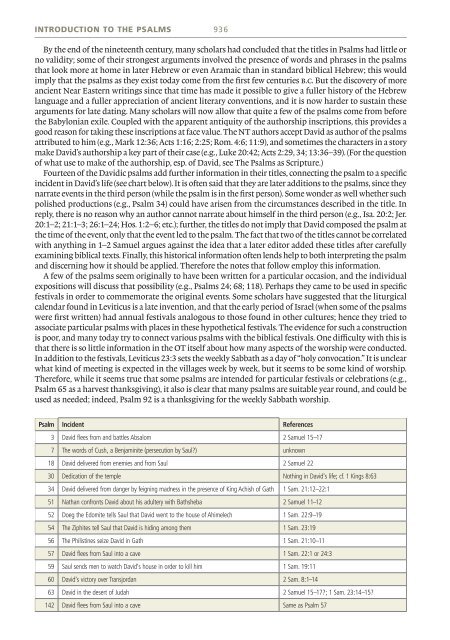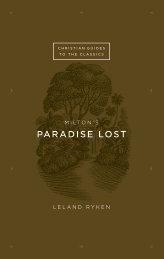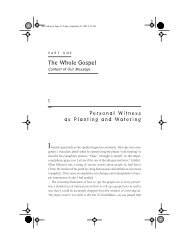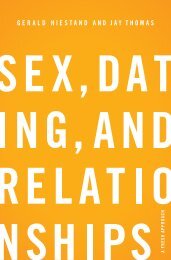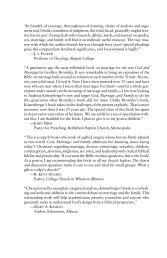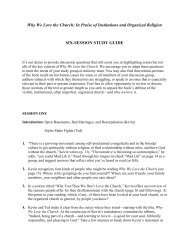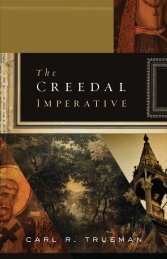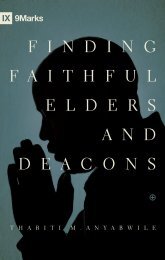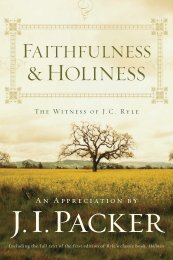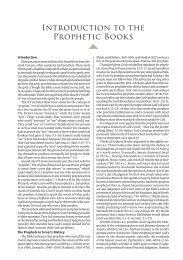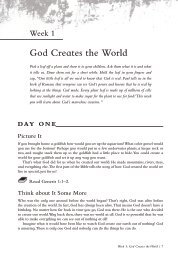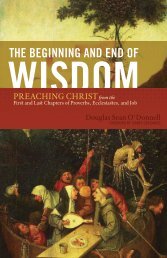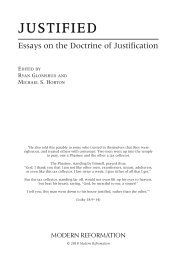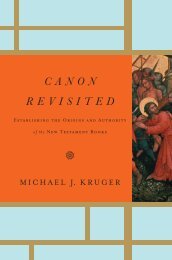ESV Study Bible Sample (Psalms) - Monergism Books
ESV Study Bible Sample (Psalms) - Monergism Books
ESV Study Bible Sample (Psalms) - Monergism Books
- No tags were found...
You also want an ePaper? Increase the reach of your titles
YUMPU automatically turns print PDFs into web optimized ePapers that Google loves.
Introduction to The <strong>Psalms</strong>936By the end of the nineteenth century, many scholars had concluded that the titles in <strong>Psalms</strong> had little orno validity; some of their strongest arguments involved the presence of words and phrases in the psalmsthat look more at home in later Hebrew or even Aramaic than in standard biblical Hebrew; this wouldimply that the psalms as they exist today come from the first few centuries b.c. But the discovery of moreancient Near Eastern writings since that time has made it possible to give a fuller history of the Hebrewlanguage and a fuller appreciation of ancient literary conventions, and it is now harder to sustain thesearguments for late dating. Many scholars will now allow that quite a few of the psalms come from beforethe Babylonian exile. Coupled with the apparent antiquity of the authorship inscriptions, this provides agood reason for taking these inscriptions at face value. The NT authors accept David as author of the psalmsattributed to him (e.g., Mark 12:36; Acts 1:16; 2:25; Rom. 4:6; 11:9), and sometimes the characters in a storymake David’s authorship a key part of their case (e.g., Luke 20:42; Acts 2:29, 34; 13:36–39). (For the questionof what use to make of the authorship, esp. of David, see The <strong>Psalms</strong> as Scripture.)Fourteen of the Davidic psalms add further information in their titles, connecting the psalm to a specificincident in David’s life (see chart below). It is often said that they are later additions to the psalms, since theynarrate events in the third person (while the psalm is in the first person). Some wonder as well whether suchpolished productions (e.g., Psalm 34) could have arisen from the circumstances described in the title. Inreply, there is no reason why an author cannot narrate about himself in the third person (e.g., Isa. 20:2; Jer.20:1–2; 21:1–3; 26:1–24; Hos. 1:2–6; etc.); further, the titles do not imply that David composed the psalm atthe time of the event, only that the event led to the psalm. The fact that two of the titles cannot be correlatedwith anything in 1–2 Samuel argues against the idea that a later editor added these titles after carefullyexamining biblical texts. Finally, this historical information often lends help to both interpreting the psalmand discerning how it should be applied. Therefore the notes that follow employ this information.A few of the psalms seem originally to have been written for a particular occasion, and the individualexpositions will discuss that possibility (e.g., <strong>Psalms</strong> 24; 68; 118). Perhaps they came to be used in specificfestivals in order to commemorate the original events. Some scholars have suggested that the liturgicalcalendar found in Leviticus is a late invention, and that the early period of Israel (when some of the psalmswere first written) had annual festivals analogous to those found in other cultures; hence they tried toassociate particular psalms with places in these hypothetical festivals. The evidence for such a constructionis poor, and many today try to connect various psalms with the biblical festivals. One difficulty with this isthat there is so little information in the OT itself about how many aspects of the worship were conducted.In addition to the festivals, Leviticus 23:3 sets the weekly Sabbath as a day of “holy convocation.” It is unclearwhat kind of meeting is expected in the villages week by week, but it seems to be some kind of worship.Therefore, while it seems true that some psalms are intended for particular festivals or celebrations (e.g.,Psalm 65 as a harvest thanksgiving), it also is clear that many psalms are suitable year round, and could beused as needed; indeed, Psalm 92 is a thanksgiving for the weekly Sabbath worship.********CHART 1***Psalm Incident References3 David flees from and battles Absalom 2 Samuel 15–177 The words of Cush, a Benjaminite (persecution by Saul?) unknown18 David delivered from enemies and from Saul 2 Samuel 2230 Dedication of the temple Nothing in David’s life; cf. 1 Kings 8:6334 David delivered from danger by feigning madness in the presence of King Achish of Gath 1 Sam. 21:12–22:151 Nathan confronts David about his adultery with Bathsheba 2 Samuel 11–1252 Doeg the Edomite tells Saul that David went to the house of Ahimelech 1 Sam. 22:9–1954 The Ziphites tell Saul that David is hiding among them 1 Sam. 23:1956 The Philistines seize David in Gath 1 Sam. 21:10–1157 David flees from Saul into a cave 1 Sam. 22:1 or 24:359 Saul sends men to watch David’s house in order to kill him 1 Sam. 19:1160 David’s victory over Transjordan 2 Sam. 8:1–1463 David in the desert of Judah 2 Samuel 15–17?; 1 Sam. 23:14–15?142 David flees from Saul into a cave Same as Psalm 57


